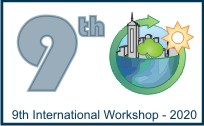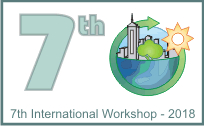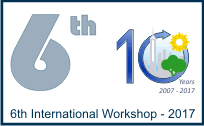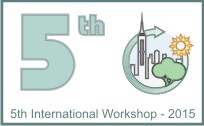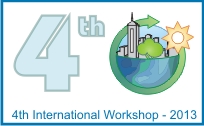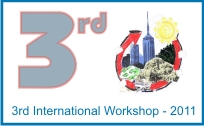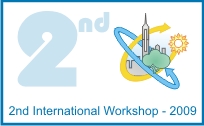
Full version of Technical Report - [click here]
Summary
The international conference was organized by the Postgraduate Program in Production Engineering (Master's and Doctoral Program) and Co-organized by Dongguan University of Technology, Parthenope University, University of Sheffield, Deakin University. The event counted with the partnership of the (University of Firenze, Italy), UNISON (Universidad de Sonora, México), the University of Manitoba (Canada), BNU (Beijing Normal University, China), the Journal of Cleaner Production, and the ACPN (Advances in Cleaner Production Network). The hosting institutions were the Guangdong University of Technology, Beijing Normal University, and Hainan Tropical Ocean University
The partnership with the Journal of Cleaner Production, that started during the 1st IWACP was maintained with the support of the Co-Editors in Chief: Prof. Cecilia M. V. B. Almeida, Prof Yutao Wang and Prof. Jiri Klemes. This year, the conference received also support from Energy and the Journal of Environmental Accounting and Management. Three special Issues will account for the contributions of the 8th IWACP participants.
The Vice Dean for Post-Graduate Studies and Scientific Research of UNIP had the merit of the conference success, having been responsible for infrastructure support.
In the second event organized outside Brazil, the organizing Committee considered that all the pre-established goals proposed to be attained during the 8th IWACP were fully reached:
(1) The academic information exchange goal was fully achieved. It was significant the number of participating academic institutions (160 universities and colleges), that reflected in the 169 academic contributions presented. The excellent quality of the contributions presented, in a process of continuous improvement as was seen edition by edition, resulted in another invitation by the Journal of Cleaner Production (JCLP), for a seventh special issue, a second special issue in the Journal of Environmental Accounting and Management (JEAM), and for the first time, an special issue in Energy.
(2) Presentations of recent achievements in CP were made by a significant number of participants.
(3) The common problems and routing of solutions was extensively and deeply discussed at plenary sessions, oral presentations, and workshops. This time, the workshops were organized under the theme Cleaner Production 40 years. Six workshops were offered during the conference to discuss the attitudes needed to answer the theme question: How are Cleaner Production and Cities Leading the Next Sustainable Development?.
The first workshop "Global Cleaner Production 40 years”, was conducted by Dr. Yutao Wang (Fudan University, Shanghai, China) and provided a deep discussion on the pillars on which cleaner production may lie, and how it evolved since its introduction into the academic community. Dr. Wang talked about the famous ten events of environmental pollution to the publication of Silent Spring that awaked people's environmental consciousness, which lead to the environmental movement in 1960s-1970sand how to achieve a win-win situation between ecology and economy. A remind on the role of CP emphasizing the concept of “prevention is the solution to pollution” was used to revisit the history, context, and future trends of global cleaner production.
The second workshop “Cleaner Production 40 years in Latin America” was conducted by Dr. Cecilia M. V. B. Almeida (Paulista University, São Paulo, Brazil). The workshop underscored the evolution and features of the development of Cleaner Production and Cleaner Production Centers in Latin America. The role of universities that have integrated the approach into their master and doctorate programmes, and the leading role of the Universidade Paulista, which developed a series of thesis and articles on environmental concerns and launched the International Workshop on Advances in Cleaner Production in partnership with the Journal of Cleaner Production was emphazised. An overview of the CP evolvement in Latin America highlighted the steps that have already been taken, the current situation and some prospects for the future.
Dr. Giovanni Baiocchi,( University of Maryland - USA) offered the workshop titled “Cleaner Production 40 years in USA” highlighting the discussion on the main causes and the main alternatives to decrease the carbon footprint from industries and services and describing experiences from North America. The challenges for the future in the face of climate change impactswas placed on a framework for action that goes beyond the firm to include relationships between companies, social institutions, and consumers.
The fourth workshop “Cleaner Production 40 years in European Union” was directed by Dr. Gang Liu (University of Southern Denmark - Denmark). The workshop helped to reflect on the history of the theory, applications, and policy framework of cleaner production in Europe, from prevention to circular economy and sustainable production and consumption. Examples were used to illustrate this development and also to discuss its implications on addressing overall sustainability challenges and achieving United Nations Sustainable Development Goals.
The fifth workshop, "Cleaner Production 40 years in Oceania", was conducted by Dr. Linda Hanckok (Deakin University - Australia), when participants were invited to reflect on options towards future sustainability. Participants were invited reflect on the key advances and challenges in cleaner production in Oceania by focusing on.”hot” issues in selected parts of the region in terms of “what have we accomplished in 40 years”.
"Cleaner Production 40 years in China" was the topic of the sixth workshop, Dr. Lei Shi(Tsinghua University – China) talked about cleaner production implementation and promotion in key industrial sectors, such as iron & steel, pulp & paper, textile, leather, metals, cement, plastics and chemicals. History and trends of cleaner production education as part of education for sustainable development was also underscored. Along with some obstacles and challenges for the in-depth implementation of cleaner production in China, including the discontinuity of policies, the movement feature of policy implementation and the poor innovation industry ecosystem.
(4) The increase in international relationship through individual and institutional contact was a goal achieved. Participants of 15 countries attended the conference.
(5) The deepening of the discussion on the fundamental theme of the conference: How are Cleaner Production and Cities Leading the Next Sustainable Development? was the concern of the conference. Given these impressive results, the Organizing Committee is honored for having organized the 8th International IWACP.
Hosted by Guangdong University of Technology, Beijing Normal University, Hainan Tropical Ocean University
|
Organized by |
Co-organized by Paulista University, Dongguan University of Technology, Parthenope University, University of Sheffield, Deakin University |
in participation with |
















